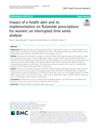 51 citations,
May 2011 in “Phytotherapy Research”
51 citations,
May 2011 in “Phytotherapy Research” Ginseng, especially red ginseng, may help regrow hair and block a hair loss-related enzyme.
 47 citations,
July 2013 in “Pharmacological Reviews”
47 citations,
July 2013 in “Pharmacological Reviews” Regenerative pharmacology, which combines drugs with regenerative medicine, shows promise for repairing damaged body parts and needs more interdisciplinary research.
 37 citations,
May 2003 in “Journal of Consumer Marketing”
37 citations,
May 2003 in “Journal of Consumer Marketing” The debate on direct-to-consumer pharmaceutical ads continues, with consumers finding them educational and doctors concerned about their impact on patient relationships and medication understanding.
 22 citations,
August 2014 in “Clinical endocrinology”
22 citations,
August 2014 in “Clinical endocrinology” Taking finasteride for benign prostate hyperplasia may increase the risk of osteoporosis, especially at higher doses.
 6 citations,
March 2019 in “International Journal of Molecular Medicine”
6 citations,
March 2019 in “International Journal of Molecular Medicine” Finasteride microspheres help reduce hair loss for up to eight weeks with fewer side effects.
 2 citations,
June 2020 in “BMC Health Services Research”
2 citations,
June 2020 in “BMC Health Services Research” Health warnings and public health actions led to a significant drop in flutamide prescriptions for women, but off-label use still continues.
 2 citations,
October 2000
2 citations,
October 2000 The investigation found no work-related causes for employee hair loss at Equifax Payment Services, and the environment was not hazardous.
 June 2024 in “International journal of nanomedicine”
June 2024 in “International journal of nanomedicine” Azelaic acid micro/nanocrystals, especially with ultrasound and salicylic acid, greatly improve acne treatment.

Hair keratin treatments can be harmful, potentially causing health issues like skin reactions and cancer.
 July 2021 in “Research Square (Research Square)”
July 2021 in “Research Square (Research Square)” Semecarpus anacardium leaf extract fights breast cancer and extends survival in mice.
 June 2007 in “Journal of The Royal Society for The Promotion of Health”
June 2007 in “Journal of The Royal Society for The Promotion of Health” Smoking doubles the risk of blindness, and physical exercise helps dyslexic children read better.
 117 citations,
August 2008 in “Sociology of Health and Illness”
117 citations,
August 2008 in “Sociology of Health and Illness” The conclusion is that the increasing use of drugs for lifestyle reasons is a complex issue influenced by corporate profit, consumer behavior, and the medicalization of everyday life, with potential negative effects on personal well-being.
 51 citations,
February 2010 in “Analytical and Bioanalytical Chemistry”
51 citations,
February 2010 in “Analytical and Bioanalytical Chemistry” Researchers developed a method to detect hormone-blocking drugs in wastewater and found them in Beijing's sewage, suggesting they can survive sewage treatment.
 40 citations,
June 2013 in “Journal of cosmetic dermatology”
40 citations,
June 2013 in “Journal of cosmetic dermatology” Brazilian keratin treatments can straighten hair but may contain harmful formaldehyde.
 29 citations,
November 2012 in “Journal of The European Academy of Dermatology and Venereology”
29 citations,
November 2012 in “Journal of The European Academy of Dermatology and Venereology” Use 5% minoxidil or oral finasteride for mild-to-moderate hair loss, combine with hair transplant for severe cases.
 26 citations,
February 2009 in “Drug Development Research”
26 citations,
February 2009 in “Drug Development Research” 17α-estradiol is a safe estrogen that might protect the brain and doesn't cause feminization, needing more research for treating brain diseases.
 24 citations,
January 2015 in “Evidence-based Complementary and Alternative Medicine”
24 citations,
January 2015 in “Evidence-based Complementary and Alternative Medicine” Polygonum multiflorum can promote hair growth when taken orally or applied topically.
 22 citations,
October 2019 in “International Journal of Nanomedicine”
22 citations,
October 2019 in “International Journal of Nanomedicine” The nanoparticles improved hair growth and enlarged hair bulbs.
 22 citations,
July 2017 in “BMC complementary and alternative medicine”
22 citations,
July 2017 in “BMC complementary and alternative medicine” Natural remedies for hair and scalp issues are still widely used in Palestine.
 22 citations,
October 2011 in “Bone”
22 citations,
October 2011 in “Bone” Androgens affect bone and fat cell development differently based on the cells' embryonic origin.
 12 citations,
April 2015 in “InTech eBooks”
12 citations,
April 2015 in “InTech eBooks” Platelet Rich Plasma (PRP) shows promise for tissue repair and immune response, but more research is needed to fully understand it and optimize its use.
 11 citations,
March 2017 in “Journal of Biomedical Semantics”
11 citations,
March 2017 in “Journal of Biomedical Semantics” The Drug Ontology was updated to better classify drugs for hypertension, malaria, and opioid abuse, and to allow for more accurate research queries.
 7 citations,
January 2001 in “PharmacoEconomics”
7 citations,
January 2001 in “PharmacoEconomics” The article concludes that a balance is needed between individual healthcare needs and societal resources when it comes to lifestyle drugs, with a call for compassionate policy application.
 1 citations,
July 2015 in “Cambridge University Press eBooks”
1 citations,
July 2015 in “Cambridge University Press eBooks” Testosterone therapy can improve sexual function in women but long-term safety is unclear.
 1 citations,
December 2011
1 citations,
December 2011 Marine-derived ingredients show potential for hair health but need more human trials to confirm effectiveness.
 December 2013 in “Biomedical and biopharmaceutical research”
December 2013 in “Biomedical and biopharmaceutical research” Nanotechnology shows promise for better drug delivery and cancer treatment.
 July 2002 in “Australasian Journal of Dermatology”
July 2002 in “Australasian Journal of Dermatology” Maintaining anticoagulation is crucial for patients with antiphospholipid syndrome.
 2295 citations,
August 2012 in “The international journal of transgenderism/International journal of transgenderism”
2295 citations,
August 2012 in “The international journal of transgenderism/International journal of transgenderism” The guidelines recommend informed consent for gender-affirming treatments and stress the importance of personalized, culturally sensitive care for transgender individuals.
 30 citations,
February 2018 in “Journal of Pharmacy and Pharmacology”
30 citations,
February 2018 in “Journal of Pharmacy and Pharmacology” Hedychium spicatum has medicinal properties but needs more research for scientific validation and use.
 28 citations,
May 2013 in “The Journal of Steroid Biochemistry and Molecular Biology”
28 citations,
May 2013 in “The Journal of Steroid Biochemistry and Molecular Biology” Testosterone therapy can improve sexual desire and function in postmenopausal women but should be used cautiously and not based solely on testosterone levels.






























